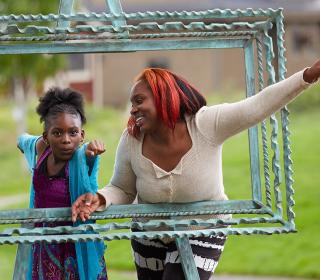Centering Black Women and Girls
Our vision is to create a society where individuals are not judged by their race or gender. Black women and girls have historically been silenced and undervalued due to institutional racial barriers. We work towards creating equality in our society by empowering these women who are often considered the farthest from opportunity. For Volunteer Services, we aspire to empower Black women and girls by putting their skills and passions into action through inclusive leadership practices.

A Word on Inclusive Leadership
Inclusive leaders are an important part of any leadership system. At YWCA, we look at issues affecting us and our community through the lens of race and racism. With this, we see diversity as a necessity in leadership positions in order to effectively build an equal and equitable society.

For the last 12 years, Natonia Tayag has dedicated her time working towards gender and racial equality with YWCA in our Human Resources Department where she currently works as our HR Manager. Take a look at our chat about inclusive leadership below.
What is inclusive leadership?
It’s creating space for everyone, especially for those furthest from opportunity. It starts with being cognizant that not everyone comes into a space and feels included and why. In order to be a leader we need to have awareness of this so we can work to improve it by including those folks.
What are some traits of an inclusive leader?
Someone who meets people where they are at and understands why that is important. Knowing how to check their own privileges and biases because we don’t always do it and having insurances in place to help them do that.
For example, I value feedback so it’s important that if I am not being cognitive of spilling my privileges, I make myself accessible and receptive to feedback and make that a comfortable thing to do.
A leader is different than a manager or supervisor. Those don’t go hand in hand.

Why is inclusive leadership important?
How else do we do the work? How can we expect ourselves to do anti-racism work and meet our goals and mission if we don’t apply inclusive leadership. We need to involve everyone.
What is an example you have seen of inclusive leadership practices at YWCA?
Our division did an internal culture shift project. We looked at our workplace culture in response to our agency’s Social Justice Accountability Team (SJAT) meetings. Previously, SJAT was the only space employees could directly interact with executive members resulting in meetings that deterred from client-centeredness.
The Human Resources, Social Justice, and Volunteer Services departments analyzed data from staff surveys and focus groups to determine the agency culture and recommended interventions to shift the culture to meet the needs of the staff. This was presented via PowerPoint at a SJAT meeting. This project was a collaborative effort that included the voices of those impacted with support from executive team and agency as a whole through the lens of race. Some of the interventions that have come to fruition include mission-aligned agency badges and a more transparent budget process.

How can we inspire inclusivity?
People need to know why they are doing what they do. We need to have those discussions about what we have when we are inclusive and what we have when we’re not. Everybody benefits from everyone being included.
- If you are in a leadership position, you need to create space for others to speak up and be involved in decision-making when possible.
- If you are not in a leadership position, ask how we can make a more inclusive culture and reach out to others to make sure everyone feels included.
What do you see is the biggest challenge of committing to diversity for organizations in the long-run?
Change is hard for people and trouble with changes happen. Organizations must commit to it as something that doesn’t just look good but is good for communities and keep up sustainable practices. It is human nature to fear the unknown and, if you’re used to a world that is not diverse, change can be difficult.
Inclusive Leadership in Practice
- Analyzing disparities in the population you serve
Awareness is the first step of creating an inclusive culture. Gather and analyze data to see where you may fall short in connecting with the communities you are trying to reach.
- Take the initiative to include
Once you know where disparities are, you can tackle the obstacles that created them. Creating space for black women and girls is a priority of YWCA’s to inspire them to grow their strength and confidence and feel empowered.
- Establishing the culture
Diversity thrives in an inclusive culture. Making inclusive leadership an organizational value encourages us to lift each other up and celebrate diversity.
I want to thank Natonia for talking with me about inclusive leadership, as well as her time at YWCA doing racial and gender equity work.
Learn more about the black and African American women who have paved the way for inclusive leadership by attending our History Café at MOHAI on September 18.
For information about getting involved with YWCA, check out our volunteer page.

Kendyl Hardy is the Volunteer Services Coordinator at YWCA Seattle | King | Snohomish. As an avid volunteer herself, Kendyl finds volunteering is a way to grow personally and as a community. Kendyl graduated with a degree in Public Relations with a concentration in nonprofit management. Throughout her college career, she worked to highlight the importance of civic service to sustain society and feature dialogue about issues affecting our communities.
We share the stories of our program participants, programs, and staff, as well as news about the agency and what’s happening in our King and Snohomish community.


